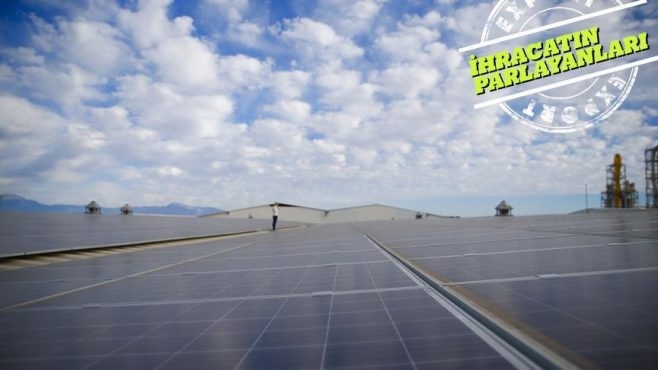

CW Enerji, a solar panel manufacturer operating in Antalya Organized Industrial Zone, exports solar panels to 12 countries.
Volkan Yılmaz, General Manager of CW Enerji Company, which has been operating in Antalya since 2010, said that their current capacity is 420 Megawatts (MW) per year and that the company, which employs over a thousand people, is the largest company in Türkiye that has invested in this field.
Explaining that they have domestic and international sales and that their factory, which currently operates in an area of 12 thousand square meters, is not enough, Yılmaz said, “We are establishing a new production facility of 46 thousand square meters. When the new factory is commissioned, our production capacity will increase to 920 MW. We plan to commission the facility within 5-6 months. While we currently export to approximately 12 countries, we will export to at least 20-25 countries with the new investment.”
Emphasizing that they currently export to countries such as Germany, Romania, Switzerland, Iran, Morocco, Kosovo, Tunisia, Syria and Iraq, Yılmaz noted that they will sell products to new markets in America, Europe and Africa with the new investment.
Stating that China, the USA and South Korea are currently leading the world in solar energy panels, but Türkiye has been progressing with great momentum since 2014, Yılmaz said, “It is a very fast-growing market. We were a little late in this field, but we got back on our feet very quickly. Hopefully, in the next 5-10 years, with the widespread use of production technologies and panels, Türkiye will be one of the countries that will write its name in the super league of the sector.”
Explaining that the market for solar panels is growing steadily because solar panels are much more affordable and efficient than they were 5-6 years ago, Yılmaz said, “Normally, the most economical method of generating electrical energy is nuclear energy, followed by natural gas and coal power plants. Now, in 2017, the whole world has seen and accepted that generating energy from the sun is even more economical than nuclear, let alone natural gas. Solar energy is currently the most economical electricity generation technology in the world.”
Stating that 2.5 percent of Türkiye's installed capacity of electrical energy is currently provided by the sun, Yılmaz said that as solar panels become cheaper, the world will turn to this type of energy, which will increase the production of solar panels.
Stating that all of Türkiye's energy can be obtained from the sun, Yılmaz said:
“If you build a solar power plant on an area the size of Bilecik, for example, one of the smallest provinces in Türkiye, you can obtain the electricity needs of the whole country. When we turn our heads in Antalya, we see the foothills of the Taurus Mountains. They are very idle lands sloping towards the south, not cultivated, not planted, not practiced any agriculture. Even if we cover only non-agricultural land at the foothills of the Taurus Mountains with solar panels, we can generate electricity for a significant part, if not all, of Turkey.
Explaining that the only energy technology that can be used for individual consumption today is solar energy technology, Yılmaz noted that a nuclear power plant or a natural gas cycle plant cannot be built on the roof of a house, but solar energy panels can be installed. Yılmaz emphasized that solar energy panels can be installed on the roofs of houses, apartments, greenhouses and roadsides.
Explaining that their company has solar roofing material panel designs, Yılmaz said, “We turned the solar panel into a roofing material. We made the first examples. It had a serious echo in the sector in Türkiye and in the world. This is a completely different investment issue.”
Stating that the company's goal is to be among the world's best developing and most technological companies in the medium term, Yılmaz said, “We are currently the largest solar panel manufacturer in Türkiye. Hopefully, with our new factory, we will become the largest solar panel manufacturer in Europe. Our sales started in Europe, America and Africa even before we commissioned the factory.”